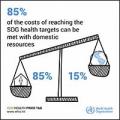What's New
Displaying results 1851 - 1860 of 4899
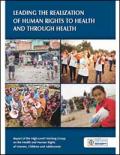
Resource | Publications,
Healthy women, children and adolescents whose rights are protected are the very heart of sustainable development. Their inherent right to the highest attainable standard of health is enshrined in the constitution of the World Health Organization and international human rights law. When their right to health is upheld, their access to all other human rights is also enhanced, triggering a cascade of transformative change. Survive, thrive AND transform: that is the clarion call of the Global Strategy for Women’s, Children’s and Adolescents’ Health (2016–2030). If rights to health and through health are upheld, delivery of the Sustainable Development Goals (SDGs) will indeed leave no one behind.
Recognizing this, one year ago, the World Health Organization and the Office of the High Commissioner for Human Rights announced the formation of a High-Level Working Group on the Health and Human Rights of Women, Children and Adolescents. The Group was tasked with securing political support for the implementation of the human rights-related measures contained in the SDGs and the Global Strategy.
The High-Level Working Group is convinced that committed leadership for collective action is urgently needed to safeguard the full exercise of women’s, children’s and adolescents’ human rights for their health and for the health of their communities.
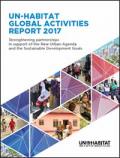
Resource | Publications,
This report focuses on selected normative and operational activities initiated by UN-Habitat with its partners to support governments at various levels in planning and designing appropriate national urban policies and building institutional and human capacities for sustainable urbanization. In particular, the Global Activities Report 2017 pays tribute to the partnerships established in support of the New Urban Agenda and the Sustainable Development Goals to pursue a better urban future for all.
This report is subdivided into two major parts. Part I of the document highlights some of the global initiatives and partnerships that were developed or expanded in 2015-2016 to illustrate the range of thematic areas covered by UN-Habitat within its mandate, and in the execution of its focal point role in the area of housing and sustainable urban development. Further, as the large majority of UN-Habitat's work is delivered at the national and local levels, Part II of this report sheds light on its regional commitments and strategic partnerships.
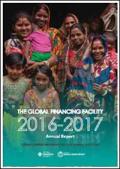
Resource | Publications,
This annual report marks not only another exciting year of the Global Financing Facility in support of Every Woman Every Child (GFF), but the end of its first phase. In this report from the GFF secretariat, we want to share with you what we have learned from countries that makes us excited and confident in the GFF as a pathfinder for a new way of financing development.
In 2017, we are in a changing global environment with finite resources for development assistance, where many global health and nutrition initiatives are competing for limited donor resources and where financiers—public and private—want the assurance of significant returns on the investments they make. This is also a time when the challenges that countries face—from fragility and climate change to changing disease patterns and health profiles across the life cycle—call for new thinking while poor communities in all countries also face the unfinished agenda of reproductive, maternal, newborn, child and adolescent health and nutrition (RMNCAH-N).
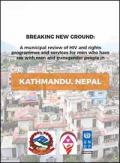
Resource | Reviews and Snapshots,
Breaking new ground: A municipal review of HIV and rights programmes and services for men who have sex with men and transgender people in Kathmandu, Nepal was conducted in 2014-2015 as part of the broader UNDP-led initiative that examined HIV and rights programmes and services for men who have sex with men and transgender people in seven South Asian cities. The review aims to inform and strengthen Kathmandu’s municipal HIV and rights responses for these vulnerable key populations. Government and community leaders were crucial to the review process as they provided valuable inputs that informed the recommendations.
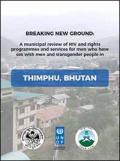
Resource | Publications,
This review of HIV and rights-based programmes for men who have sex with men and transgender people was undertaken in Thimphu, Bhutan through a partnership between the Ministry of Health, the Royal Government of Bhutan and the United Nations Development Programme.
Regional and global research demonstrates that HIV risk and vulnerability can be exacerbated by the mobility of populations and changing social norms in urban settings. The need for increased information and research in the cities of Bhutan is imperative given the steady rate of urbanization in the country. With the increasing trend of ruralurban migration, there is a need for health interventions to be prioritized, considering the growing vulnerabilities and increasing risk to HIV among men who have sex with men and transgender people.
The Ministry of Health, Royal Government of Bhutan is committed to continuing our efforts in the design and implementation of appropriate health and rights-based interventions on HIV, and to promote universal access to prevention, care and support for the affected and vulnerable sections of our population — including men who have sex with men, transgender people and all those living with HIV.
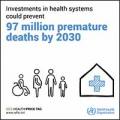
Resource | Infographics,
Infographics on Sustainable Development Goals (SDGs): Preventing Premature Deaths
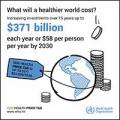
Resource | Infographics,
Infographics on Sustainable Development Goals (SDGs): What Will a Healthier World Cost?
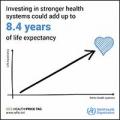
Resource | Infographics,
Infographics on Sustainable Development Goals (SDGs): Extending Life Expectancy
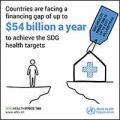
Resource | Infographics,
Infographics on Sustainable Development Goals (SDGs): Financial Gap to Achieve the SDG Health Targets






